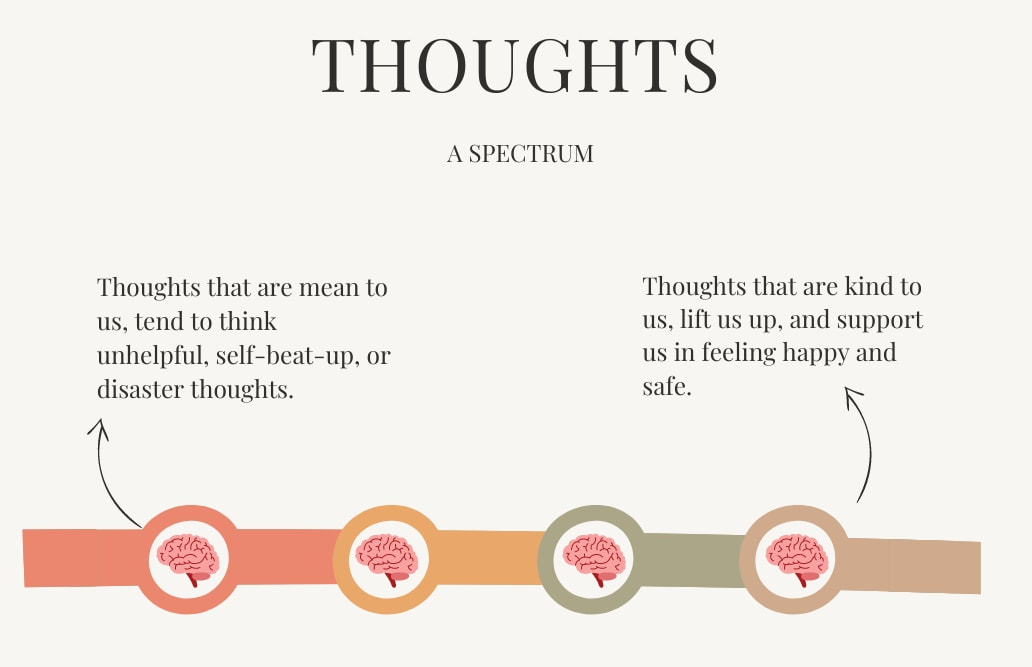You Are Not Your ThoughtsWhile none of us are our thoughts, we all experience thoughts differently. Some of us have an active inner dialogue that runs 100mph every waking moment - and some of us don't have an internal dialogue at all. Some of us grew up in situations and with a family that programmed in us thoughts of positivity and safety - and some of us grew up in situations that programmed thoughts of negativity and fear. Some of us find the world a fairly easy place to live that makes sense to us (commonly neurotypical humans), and some of us find the world a very challenging place to live that makes no sense (commonly neurodiverse humans). Some of us are blessed with a chemical make-up that easily creates dopamine, serotonin, oxytocin - and we feel happy, content and loved... and some of us have bodies that struggle to make these "feel good" chemicals and we tend towards feeling isolated, depressed and anxious. This is ALL normal. If you find yourself closer to the left side of this chart (unhelpful thoughts) here are a few suggestions: #1 - Be Soft with Yourself - Give yourself a break, wear soft clothes, listen to soft music, postpone that appointment. Make room to nurture yourself, and surround yourself with softness. #2 - Do The Work to Reprogram Your Thoughts - Yes, you can change your thoughts with attention and intention. When you are faced with an unhealthy thought, correct yourself by replacing it with a more positive statement: I am not *insert unhealthy thought*, I am *insert positive thought*. For example if you have a thought that says, "I am not good enough because I did not get this job interview.", tell your brain, "That is not true. I did not get this job interview, and that is okay. I am still safe, and it just means that it was not meant for me. It is not a critique of my self-worth, and I am still worthy." #3 - Get Support - Talk to your doctor about your mental wellness, and if necessary, get the medicine that you need to feel better. If you find yourself closer to the right side of this chart (helpful thoughts) here are a few suggestions: #1 - Get Curious - When you are around someone who seems awkward, negative, or strange to you, ask questions. Discover what kind of thoughts they might be struggling with. #2 - Have Compassion - Recognize that even though you might not understand what it is like to struggle with mental health, you can imagine how difficult it would be and have compassion that other people have a different experience of the world. #3 - Recognize Your Privilege - Mental wellness is a privilege, and as such, there are things that you can do easily that other humans can't. This allows you to have more opportunity, greater energy and more ease in your life than a person who might be struggling with mental wellness.
0 Comments
Leave a Reply. |
AuthorMindy Amita AislingAuthenticity EmpowermentLife Coaching for Big-Hearted Overthinkers & Entreprenerds🐲Own Your Weird
🌎 Change Your World ⬇️ DIY Courses 👩🏻💻1:1 RemoteCoaching Fully Accredited ICF Certified Mindy Amita Aisling, is a professionally trained and board-certified leadership, authenticity, and entrepreneur coach.
Mindy exceeds all requirements set forth by the International Coaching Federation (ICF) for Master Coach certification. Mindy is also a licensed mediator, communications coach, and conflict resolution practicer. As a mediator, she has worked both in private practice and as a court appointment mediator at her local county courthouse. Through her innovative approach, she assists clients in examining their limiting beliefs, questioning their assumptions about how the world works, and releasing the notion that they are anything less than perfect. As a result, individuals who work with Mindy cultivate the ability to stand firm in their beliefs, live authentically and decisively, and discover an experience of life that is easy and graceful. In 2021, Mindy founded How to Be Human and Entreprenerd. These programs have enabled her to share her wisdom and knowledge with a broader audience in service of her vision of helping others live authentic lives This, in turn, has empowered more individuals to lead their most TRUE and COURAGEOUS lives. When she is not working, Mindy can be found playing outdoors in the beautiful Pacific Northwest, creating art, spending time with friends & family, or with her nose deep in a book. You can sign up for her newsletter here. Archives
June 2024
Categories
All
ICF Certified Life CoachAffordable Online Life Coaching |




 RSS Feed
RSS Feed
